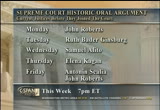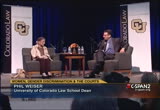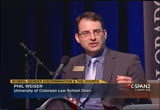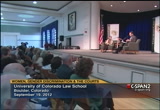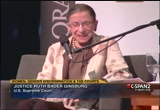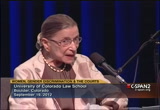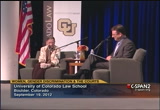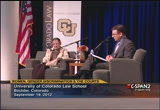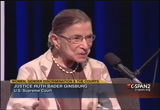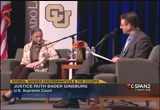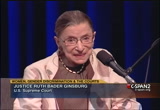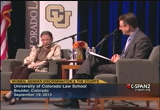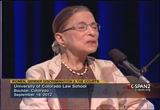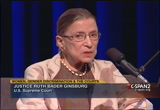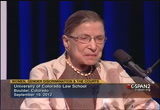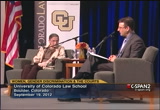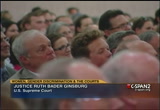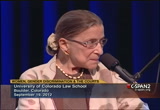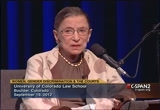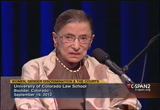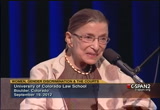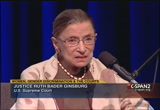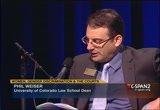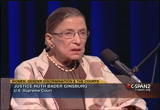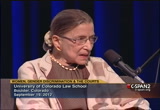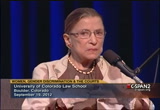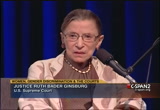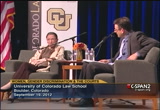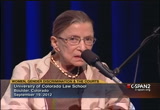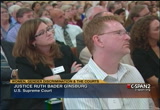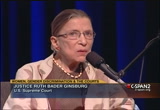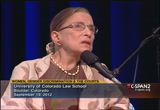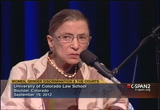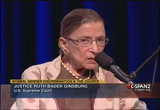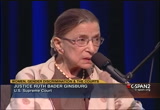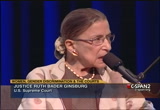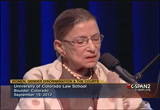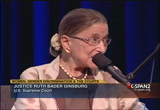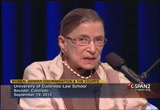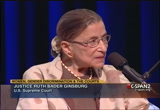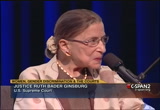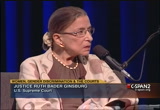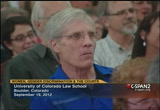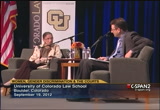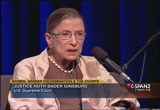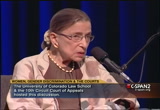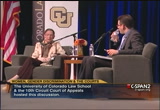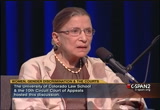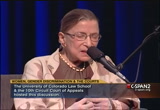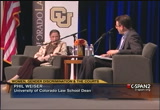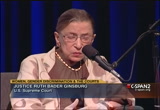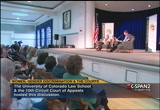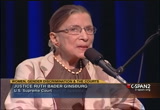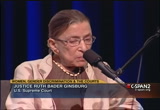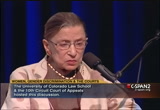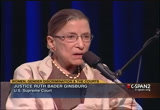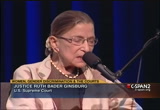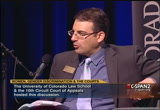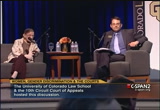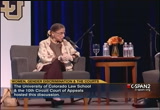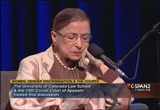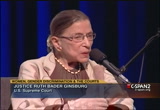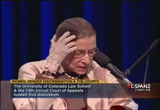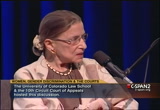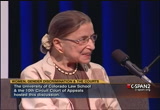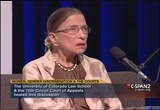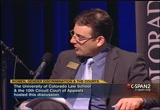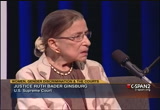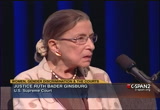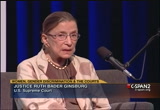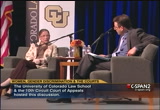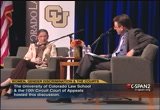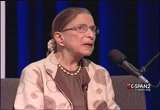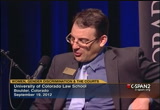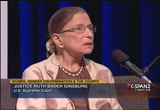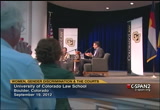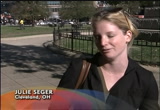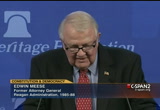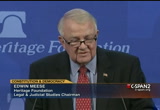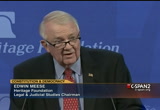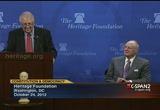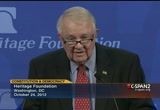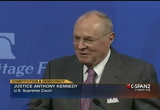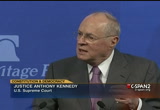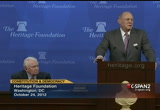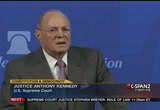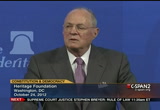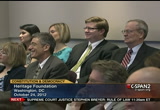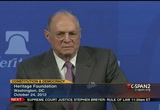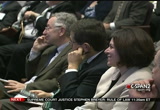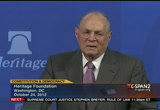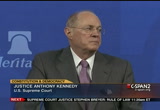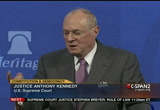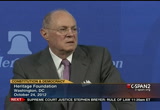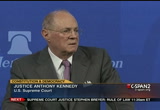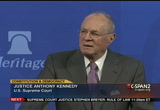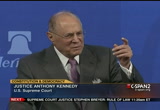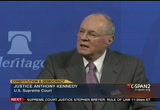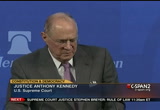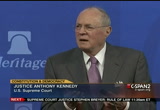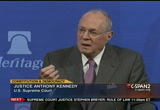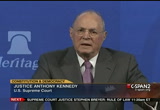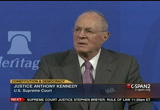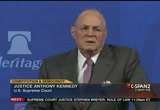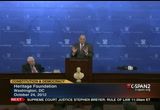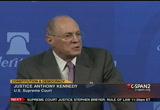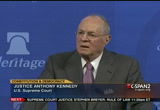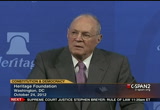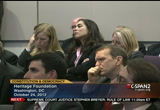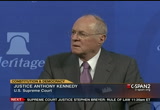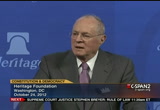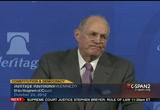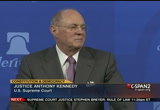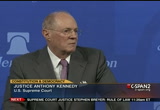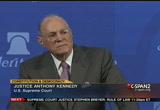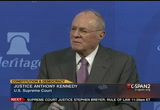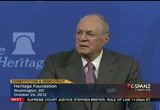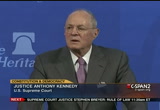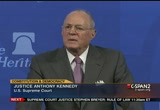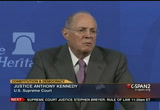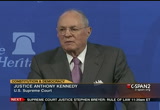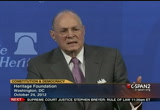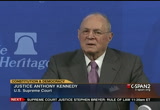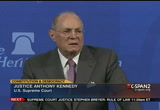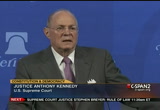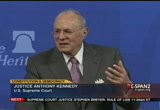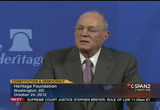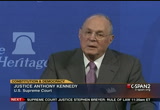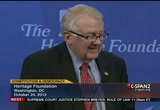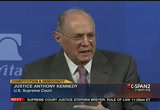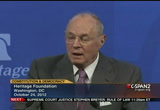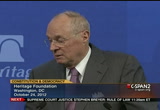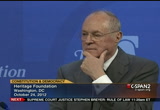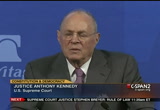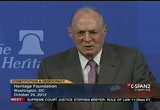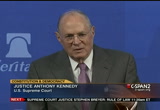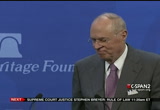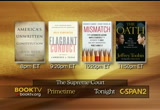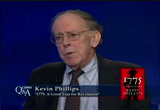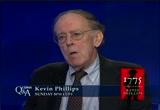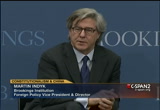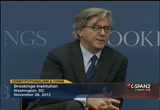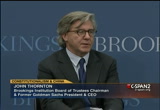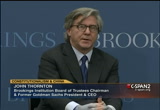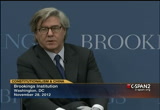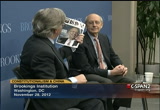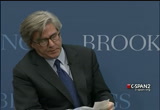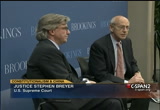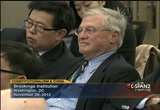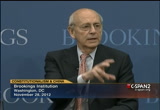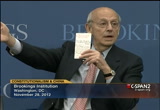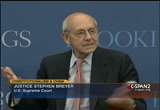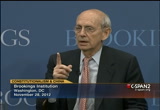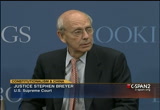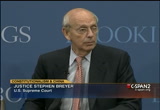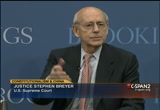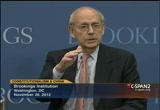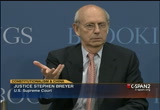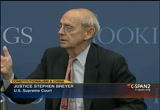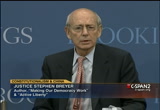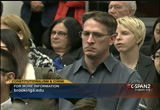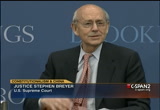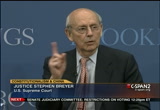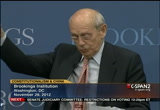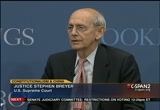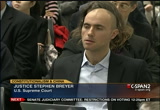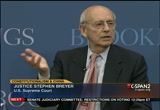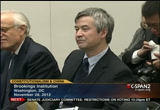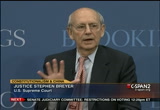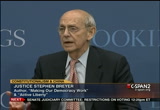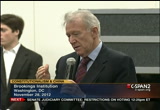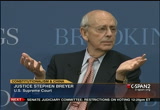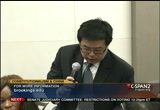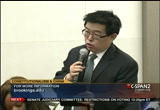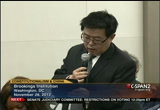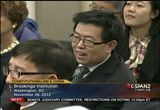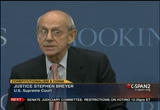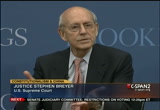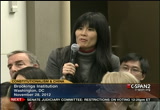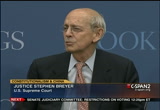tv U.S. Senate CSPAN December 26, 2012 9:00am-12:00pm EST
9:00 am
time. you can listen to c-span radio in the washington/baltimore area at 90.1 area, on xm channel 119 or online at c-span radio.org. >> supreme court justice ruth bader ginsburg spoke in the fall at the university of colorado law school. she talked about gender discrimination cases and her own experiences as a woman law school graduate in the early 1960s. this conversation is about an hour, 15 minutes. ..
9:01 am
>> we are so grateful to have you here, phil, for all your work. [applause] >> we have several regions here, two of whom are grads of our fine law school, michael and jodi your and irene is here also i believe. and any other regions are here, we thank you for all your support and your spirit. we do very much believe in engaging with the community come and we want to continue to do so in so many ways. i would echo what melissa hart said, and very importantly acknowledge the leadership in terms of the energy she brought to the white center, this lecture was her brainchild. the constitution of the activities were brainchild, and recognizing that under the board of regents, the chase award given from the president's office given to melissa hard for
9:02 am
her work in community service. so i want to acknowledge mullah so hard. [applause] -- melissa hart. >> and finally, all of you make such a difference to us. when i think about what makes a successful of the law school, having a diverse, inclusive and collaborative community about standing -- outstanding students, faculty, alumni, and friends, gives us -- the members here come and there are several, very supportive a lawns, professors, this community can come together and really make a difference. and you all matter in so many ways, so want to thank all of you. i can't name you all, but you really help make us successful. now, when justice ginsburg agreed to, she said don't want to give a lecture, but i would like a fireside chat. and i said that would be lovely.
9:03 am
and then gave myself a challenging assignment of coming up with a plan for our conversation. it was easy to know where to start, which is what a pioneer you have been, and many people here forget that in the 1950s there were very few women in law school. if you might start by reminding those who remember, and helping to enlighten those who don't, what that was like. >> in those ancient days, i began law school in 1956 when women were perhaps 3% of the lawyers in the country, no more. no woman sat on any federal board of appeals, and it been only one in history when franklin delano roosevelt
9:04 am
appointed from ohio to the sixth circuit court of appeals. when she left there were none until 1968. so in the years when i was going to law school, no women on any federal court of appeals, or on the supreme court. i had no woman teacher. that was unheard of. what was law school like? in the not so good old days. well, my class numbered over 500, and of those, nine were women. how did we feel? well, we thought all eyes were on this, so we better be prepared because if we weren't, it would reflect not only on ourselves but on all women. to see the difference, i will
9:05 am
tell you about -- a colleague of mine at columbia law school, women are in law school in numbers. this great professor said, i think it's great that we have so many women, but i have a certain long for the way it was. when the class was moving slowly and you needed a crisp, bright answer, you called on the woman your she was always prepared. [laughter] she would give you the right answer and then you could move on. well, nowadays there's no difference. [laughter] and women are as unprepared -- [laughter] as the man. one final note. the law school that i attended had to teaching buildings.
9:06 am
only one of them had a women's bathroom, so if you're in class and you had to leave, well, you might make some of the professors -- that if you're taking an exam, time pressured exam, and the building without the bathroom, you had to make a mad dash to the other building, which is the thing that, now, we never complained. that's just the way it was. >> so when you graduated law school, he faced the challenge of finding a job, something our students here are mindful of. you had what you might call a trifle challenge. firms often didn't hire jews. firms were certain skeptical of hiring women, and you're also a
9:07 am
mother. so how did that job search perceived, and how did you get your first break? >> well, those were my three strikes. [laughter] there was no title vii. i graduated in 1959. title vii under the civil rights act was in 1964, all on discrimination on the basis -- outlawed discrimination on the basis of discrimination -- religion, and sex. and 1950s, law firms, and some of the finest graduates were saying they wanted no women. they would feel uncomfortable dealing with a woman, or as often her, we hired a woman at this from once, and she was dreadful. how many men did they hire that didn't work out? so it wasn't easy to get that first job. first job was all important
9:08 am
because if you got it and performed well, then the next job was secure. well, i had a great professor, someone may know you -- some of you may know his name, he was the first constitutional law scholar, and he was in charge of getting judicial clerkship for columbia law school students. and i was special. he was determined to give me a federal clerkship. so he recommended me to a judge who always hired his law clerks from columbia. and then -- [inaudible] is ruth bader ginsburg. she has a four year old daughter. how can i rely on her? and the professor said, give her
9:09 am
a chance. if she doesn't work out, there's a man in her class who will step in and take over for her. if you don't give her a chance, i will never recommend another columbia clerk to you. now, that's how it got my first job. [laughter] it was at least a paying job. [inaudible] very high interprocess outlaw school, no one would hire her. so she volunteered to work for a county attorney free, for four months, and said if you think i'm worth it at the end of four months, you can put me on the payroll. that's how she got her first job. >> for those of you were not aware, justice o'connor is coming next year to give a
9:10 am
lecture. and i will be interested to hear her tell the story, with maybe a little more flavor. speaking of flavor, your husband, marty, bless his memory, was someone who was extraordinary on many, many levels. he supported your career and is quoted as saying his greatest single a college month was supporting you. he also come in slightly more marty humorous fashion and said, i learned very early on in our marriage that ruth was a terrible cook. [laughter] and for lack of interest was unlikely to improve. [laughter] so he said out of self-preservation i decided i had better learn to cook. you've talked about this a lot, but particular students any i would like to mention a few words about what it meant to have marty as your life partner.
9:11 am
>> well, i was blessed for 56 years, married to a man who thought my work was as important as his, and it was a great chef. and our arrangement in our early years is that i would do the everyday cooking and marty would you the weekend and company cooking. when my daughter was about 14, 15 in high school, she noticed and enormous difference between mommy's cooking and daddies. so she decided mommy should stay out of the kitchen -- [laughter] -- entirely, since 1980 when i got my first good job in 1980
9:12 am
see, i have not cooked again. [laughter] my daughter, because she takes responsibility for keeping me out of the kitchen, she comes once a month. she's a fine cook. she comes once a month and she cooks for me, feels the freezer, and then comes back the next month. each time she outdoes or so. she was with the labor day weekend and she made 48 individual meals. [laughter] there's a tribute to marty. i think he would like it beyond anything else. there's a book, a best selling book in the supreme court gift shop, it's called supreme chefs, and there's a collection of 32 of marty's many, many recipes. it was put together by the lives
9:13 am
of the justices. the justices the spouses meets quarterly, and they rotate catering responsibility. marty was always the favorite caterer. and so as justice alito's wife said, let's make a cookbook and we will call it supreme chef, and it would be marty's recipes, which she had. i think he wrote the recipes -- nothing is left out. there's nothing you can mistake. anyway, before each section, before the orders, one of the supreme court the spouses rights her memories of marty, and it
9:14 am
was very well illustrated. and then when the book was first in the gift shop, they ordered only 1000 copies. [inaudible] for npr, and by that afternoon i think she was on about nine in the morning. by 3:00, they had 3000 orders. and so now they have a goodly supply. >> speaking of marty and your joint enterprise together, there's a fabulous story about your experience as a mother and your son, genes, experience and a new city private school, and how they related to you and to marty. could you tell that story?
9:15 am
>> this is in the 70s. my child, i called him lively. is teachers called him hyperactive. [laughter] and i could expect a call once a month to tell me about my child latest escapade, to come down to see the teacher or the school psychologist, or the principle. and one day when i was particularly weary of sitting in my office, and i said this child has two parents. please alternate calls. [laughter] and it's his father's turn. [laughter] well, marty went down and went to the school, and he faced
9:16 am
three stone faces. and what was james' crime? your son stole the elevator. marty's response was, how far could he take it? [laughter] i don't know if it was marty's humor, but as you said, when the school had to alternate calls, calls came once a semester and there was no great improvement in my young son's behavior. but i think people were much more reluctant to call a man away from his work than a woman. >> so you obviously are conscious of your special role as a woman on the green card. three weeks after, he went to the state of the union, as you said, you want the country to
9:17 am
see there was a woman on the supreme court. when you joined the court, sandra day o'connor had been the only woman for some time, and she became the second. after she left, we were back to only having a single woman, and now there are three. to to reflect some on the dynamics at the court in terms of what it means to have more than one woman? >> sandra was alone on the court for 12 years. and by the way, when i showed up, sander was on the bench nine days after her breast cancer surgery. in any case, we belong to the national association of women judges, and just what would happen when i got there, number two. so they had a reception at the court in our honor, and they presented as with t-shirts.
9:18 am
and sanders read, i'm sander, not ruth. mindset i'm ruth, not sandra. [laughter] [applause] and nevertheless, every term the two of us sat together, one lawyer or another would address me as justice o'connor. the people who know us, know that we don't look anything alike. [laughter] we don't speak alike, but it was a woman's voice and the woman was justice o'connor. people like our solicitor general, the former associate of mine, and aclu. that i was there all alone and having to deal with the wrong perception of people to see just a little woman, and eight larger
9:19 am
men. but now, if you come to the court, and you really should, we are all over the bench, and because of my seniority i sit towards the middle. justice kagan is on my left, and justice sotomayor on the other. and no one has called me justice kagan, nor have they call justice kagan justice sotomayor. [inaudible] they are very active in questioning at oral argument. so, now the perception is women are here to stay. and when i'm sometimes asked when will there be enough, nine.
9:20 am
there were nine men and nobody really raised the question about that. [applause] >> so on the left, right side you were marked when you were a younger boy. you would often say something. it would be ignored. than a male colleague might say the same thing and people would say wow, what a great idea. does that ever still happen to you? and candy reflect on why inclusiveness in our society, be it gender or race, still is a continuing challenge? >> it doesn't happen now, only because of the very good job that i have. and there are only nine of us, and when i see my colleagues listen, just as i listened to each of them, but that experience, the women of my generation, all of them have had. when a woman -- [inaudible] she
9:21 am
would not say anything very important. but most of that i think is gone. today. >> the challenge of gender discrimination is one that you spend a lot of your career fighting, and it's interesting to look at the arc of chief justice rehnquist's views on this topic. when you argue before the court, and he was on it, he reportedly said that you won't settle in for putting susan b. anthony on the new dollar, would you, as victory in the overall effort. he later joined united states versus virginia calling for women to enter the virginia military institute, and he also wrote the landmark nevada versus
9:22 am
its case, in concluding that the family medical leave act would apply to state employers. when you think about the over all evolution of this doctrine, and you look at his evolution, how do you explain it? >> let me go back to the case you first mentioned. it was my last argument before the court. it was the fall of 1978. it was about putting women on juries. it wasn't all that long ago that many states either didn't put women on juries at all, allow them to sign up if they wanted to, or had an out system. that is, and extension for any woman. this was from the state of missouri. and the clerk in kansas city would send out notices, for jury
9:23 am
duty, and the nose would say if you're a woman you would not require to serve. if you don't wish to serve, check here. if no card was returned the clerk would assume that the woman didn't want to serve. there were almost no women on kansas city, missouri, jury's. so this was at a time when most states had changed. they were just a few holdouts in missouri. and i had a precious 15 minutes to argue. i divided the argument with the public defender from kansas city. i spoke second. and when i was done, about to sit down, satisfied that i got the major point i wanted to make.
9:24 am
and then, then justice rehnquist said that, so you won't settle for susan b. anthony's face on the new dollar. this is the same as when i joined the court, and my submission was going to be protected by janet reno. most attorneys general like to be called general. janet said, i am not a general. i am ms. reno. so she wasn't so accustomed to using ms. or mrs. and he wanted to make sure that he could say it smoothly, so it kind of a dress rehearsal before we went in and said ms. reno, ms. reno, three times the. [laughter] he cared about getting it right.
9:25 am
been in the vmi case, he didn't do in my, he did join the judgment. this was about admitting women to the virginia military institute, a facility that the state of virginia operated for men only and had nothing comparable for women. it wasn't a case that separate schools. most of them were on our site. the idea was the state cannot make an educational opportunity available for one sex only. in any event, that left justice scalia as the lone dissenter in the vmi case. now, the case about the family medical leave act and the chiefs understanding that it was important not to make this a maternity leave, that it should be part of the workers life when
9:26 am
you have a sick child, a sick spouse, a sick parent, you can take time off for that putting did the job in jeopardy. well, i'd like to say that i had something to do with it. i don't think that's too. i think a case that came before the court influenced him. but most of all, i think he was influenced by his granddaughte granddaughters. one of his daughters was divorced and she had two girls, and the old chief cut took responsibility for being a male parent figure for those girls. they loved him, and i think he, he thought about how he would like the world to be for them.
9:27 am
>> when you think about this evolution, starting really didn't read versus reed in 1971, which was a case involving an idaho probate law that said males must be preferred to females accord to court administered, up the vmi 25 years later, it's quite a movement in the courts position. you literally were there at every step of the way. with respect to that first step in we versus reed, could you relate how you got involved in that case? >> spent it is a good example, because they were all genuine. there were no test cases in the sense that they were set up by any organization. sally reed was a woman from boise, idaho.
9:28 am
she and her husband had a son. they separated, and sally was given custody of the boy when he was quote of tender years. then the boy reached 15, and the father said i should spend time with him, and the family court said, i suppose so. now he is prepared for a man's world. valley thought the father's home was not a good place for their son to be. but the judge made the decision it is. the boy was really depressed, and one day, took one of his father's many rifles and killed himself. so, sally wanted to be appointed
9:29 am
administrator of the boys a state. not that it didn't have any value, it didn't. for sentimental reasons. now, idaho law at the time, equally entitled to administer a decedents a state. males must be preferred to female. now, sally reed took that case with her own lawyer from boise, idaho, through three levels of the idaho court. and then when a colleague of mine read the report of the idaho supreme court decision, in the journal for lawyers, he said, this is going to be the turning point case for gender in the supreme court. and he was right.
9:30 am
sally reed want a unanimous judgment. the court pretended not to be doing anything new. that if you look back even to the liberal warren court, 1961, the court decided a case in florida, gwendolyn hoyt was the petitioner. she was what we would today call a battered woman. one day her philandering husband had humiliated her to the breaking point. she spied her young son's baseball bat in the corner of the room. with all her might, she brought it down on her husband's head. he fell to the floor, and that was the end of the argument, the end of the husband, and the beginning of the murder prosecution. so gwendolyn hoyt thought, if
9:31 am
they were women on the jury, they might better understand her state of mind. and even if they didn't a quitter of the murder charge, they might come in with a verdict for the lesser, manslaughter. she was convicted of murder by an all-male jury. and when the case came to the supreme court, as and unanimous warren court said, we don't understand what this complaint is about. women have the best of all possible worlds. and if they want to serve, they can for the asking. all they have to do is sign-up. well, think of how many men did sign up if they didn't ask you and he was gwendolyn hoyt told
9:32 am
this, dumbfounded that they didn't understand her plight. i was in 1961. the warren court, 10 years later sally reed's case came before the conservative burger court. >> so doing your time when you're litigating cases, and this becomes -- comes a question from howard university, if you have any trials? did you get involved at the trial level class or if you and did the appeals, might you need to stock all a bit about the difference between trial work and a teal work? >> -- up your work? >> there were some cases that i started at the ground up. all the way up.
9:33 am
[inaudible] let me talk about stephen's case, which he brought in the federal district court in new jersey. this was a man whose wife was a math teacher in high school. she had a healthy pregnancy. she remained in the classroom until the ninth month she went to the hospital to give birth, and the doctor came out and said, you have a healthy baby boy, but your wife died from an embolism. he was determined that he would not work full-time until the child was in school full-time.
9:34 am
he would earn a minimum he could make, and combined with social security benefits, make a living for himself and his infant son. we went to the social security office. they said we are very sorry, but these are mothers benefits. they are not available. they are available to widowed mothers, but not widowed fathers. i came to know about stephen's case when he wrote a letter to the editor, and he said i've been hearing a lot of talk about women's this. this is what happened to me. how does that fit in? tell my story to gloria steinem. so at the time i was teaching at
9:35 am
rutgers, the state university in new jersey. someone in the department came from the same town and she read this letter. and she said, that's wrong, isn't it? and i said well, why don't you suggest to stephen that he contacted the american civil liberties union? and that's how we started, in the district court. it wasn't a question of putting on evidence. the facts were all undisputed. but arguing the point that this law which was described as beneficial to women, after all widows had the benefit, disadvantaging album and. that all such laws, the root of the discrimination was against the woman. [inaudible] paid social security taxes just like the rest of us.
9:36 am
but they didn't gain for her family the same protection as the family of a male wage earner who have paid into social security. so the discrimination begins with the woman, and then the man, because he is, his role as parent rather than breadwinner, doesn't get the benefit. there was a unanimous judgment of the supreme court in that case. and by the way, we got it from the district court, from the court of first instance, to the supreme court, before he reached his third birthday. and that is record speed for federal litigation. anyway, the court reach a unanimous verdict, divided three ways. the majority thought it
9:37 am
discriminates against the woman wage earner, the very argument i just presented. three thought it discriminates against the male as the parent, and one said, i see this from the vantage point of the baby. it makes no sense, the child should have the opportunity or the personal care of the sole surviving parent. only if that parent is female, not male. of the cases that i was involved in from the ground floor to ceiling was, i call it the pregnant problem. into the early '70s, if a woman taught in public school and she began to show, could be
9:38 am
somewhere between four and six months, she was put on what was euphemistically called maternity leave. either unpaid leave. shed no right to return. the school district would call her if and when they wanted her. and one of the reasons for this policy was, after all, we don't want the children to think that their teacher swallowed a watermelon. then the ray whole series of cases involving women in service. if you were a woman in service, pregnancy was considered, called amoral or administrative ground for immediate discharge. another type of case, a woman who had a blue-collar job,
9:39 am
wanted to get health insurance for her family. her employer had a medical package, and her husband's employer, so she said it i'd like family coverage. and her supervisor said, well, i'm sorry, family coverage is available only to men. women can get single coverage, but men are the ones who cover their family. so in all these cases you can see what they were. the women were seen as someone who was at most a secondary money earner. the man is the breadwinner who counts. so when the man steps up of the proper role and wants to take care of the baby, and similarly, the woman who was essentially to get equal pay, doesn't because she is considered not the real
9:40 am
breadwinner in the family. >> so like that case, you brought a number of cases where it was the men who are suffering based on the distinction. can you talk about what drove that decision and why you chose that strategy? >> the first case in that suit was the one case. and so the benefits, social security benefits for software child and care benefits. then there was the same differential for, on retirement. a woman could get benefits for self and not from herself. or when she died, old age and survivor insurance, the man could not collect survived her.
9:41 am
so after the wife case was one, we brought a case to end all those. in the social security line. perhaps i should say something about how i stopped using the term sex and started using the word gender. and it was in that case. i had a great secretary at columbia law school who was typing my briefs. and she said, i'm typing these briefs and all over the word sex is sticking at. don't you know that the first association of that word is not what you want those judges to be thinking about? [laughter] soyuz gender. it's a nice grammar book term. it will ward off distracting associates.
9:42 am
[laughter] but the message that we're trying to get across is that when you pigeonhole people, around race, religion, whatever, and you don't let them be free, to be you and to be me, as, there's a wonderful song, that people should not be held back by man-made laws from using whatever god-given talent they have. girls as well as boys should be free to aspire. >> well, what is interesting to think about this revolution of
9:43 am
that gender discrimination doctrine is it place routes in 1971 with reed v. reed, over one pictures after the equal protection clause that forms the foundation of this doctrine was adopted. as a constructive case study in constitutional law, what lessons do we get from looking at this doctrine that didn't come around until after 100 years, based on the underlying constitutional text, how does that speak to issues around originalism or jurisprudence? >> well first, you know that the original constitution, including the bill of rights, in the original constitution and the bill of rights the word equal never appears. and if some people that's -- after all, the declaration of independence, that was the
9:44 am
motivating idea that all men are created equal. why wasn't the word equal included in the original constitution? for obvious reasons. it was the odious practice of slavery. that's why we don't get the qualities written into the constitution into the 14th amendment, one of the three post-civil war amendments, and it says in general terms, nor shall any state deny to any person the equal protection of the laws. >> well -- >> the reaction to that was, everyone knows that equal protection clause is about racial segregation, racial discrimination. had nothing to do with women.
9:45 am
and if you ask the framers of the 14th amendment, if women have the right to own property and the own names, contract in their own names, to be sued in the own names, they would probably say certainly not. were they here today, i think they would agree that the idea of equality has growth potential, and it was meant to have growth potential, to keep up with society and changes from generation to generation. so that one of the earliest arguments that was made was in the 1870s by a woman, who thought that, well, she insisted that she should exercise the most basic rights of citizen. she should be able to vote.
9:46 am
so she and vote the equal protection clause, and the court says of course women are persons. we agree with you. nor shall any person be denied equal protection of the laws. women are persons, but so, too, our children. and no one thinks children should have the right to vote. that was the attitude in the 1870s. i think the idea of equality and appreciation that racial discrimination, holding people back, because of who they are and not what they can do, is not
9:47 am
compatible with the society that believes in the equality principle. so it was in world war i. weblog to. world war ii, when we went into world war ii with segregated troops. we were fighting a war against racism, and yet our forces practiced racial discrimination but it was the awakening in the second world war, i think, first to the problem of apartheid in america, and then to the notion that all people should have the opportunities to aspire, achieve, to be whatever they have the ability and will to do. so i think the people who wrote
9:48 am
the equal protection clause would probably say yes, the 21st century, it certainly includes, we meant it to include people who were once left out. i mean, other people were left out, native americans were not considered. >> so a student, a high school student in the auditorium follows up that by asking about the rights of gays and lesbians under the equal protection clause, and how their issues are likely to follow a similar mark. do you see that similar dynamic playing out in that context? >> we know that that question runs up against the so-called ginsburg rule. which is when i was before the
9:49 am
senate judiciary committee, my rule was you can ask about anything i have written, about any of the hundreds of decisions i wrote when i was a judge on the court of appeals for the d.c. circuit, but you can't ask me questions about an issue that is likely to come before the court. and i think everybody knows that not so long ago congress passed a law called the defense of marriage act, which says marriage is between a man and woman. entity come from a state that recognizes same-sex marriage, like massachusetts, like new york, know what the state has to recognize that marriage. and it won't be recognized by any federal purposes, for example, social security. there has been a challenge to
9:50 am
the constitutionality of that at -- that act. the court of appeals upheld it unconstitutional. the review has been filed in the supreme court. we haven't acted on it yet but it would be extraordinary for the court to act, to consider the constitutionality of a law passed by congress that a lower court had held unconstitutional. so i think it's most likely that we will have that issue before the court, toward the end of the current term. and then the person who asked the question will -- [inaudible] have the answer. >> another question comes from the auditorium. the lilly ledbetter case, one
9:51 am
where you wrote a very emotionally charged dissent, that you, as i recall, read from the branch a game binge -- read from the bench, which is a rare act. and you reflect on that and also how it felt to have literally your request in the dissent, that it's up to congress, answered in the ledbetter act passed. and i believe the first law that president obama signed. >> i should perhaps process might answer by saying when anything is ready to be reviewed, the author of the majority opinion will summarize the decision from the bench. not read every word of the often long opinion. and then will note at the end justice so-and-so has filed a dissenting carry.
9:52 am
so they're not ordinary from the bench unless you feel that the court not only got it wrong, but meaningfully so. and that was when i thought in the lilly ledbetter case, i think most of you have heard about this case. lilly ledbetter was an area manager for a goodyear tire plant in gadsden, alabama, and she was the lone woman in such a position at that plant. when she was engaged in the 1970s, she got the starting salary for people in that position. but over the years, her pay slip in relation to her male peers. whether she suspected it our she
9:53 am
didn't want to be known as a troublemaker, and and then one day and she was close to retirement age, one of her coworkers put a slip in her box that said her sour, then gave the seller of all the men doing the same job. she was getting 13 cents on the dollar less than the most junior occupied of the same position. so she brought a complaint under title vii. she had a jury trial and won a sizable verdict. the decision was upheld on appeal to the court of appeals. then the supreme court said, ms. ledbetter, you suited to lead. you have 180 days from the discriminatory incident to file your lawsuit. 180 days from the first time her
9:54 am
pay slip -- pay slip. well, women who are breaking new grounds don't want to rock the vote. they also know that if they said that early on, the defense will be, had nothing to do with her being a woman. she just didn't perform as well as the men. went year after year she got performance ratings and was even awarded one of the top performers, that defense is no longer available. also, employers, many -- [inaudible] how would she even know. her view, which i fully shared, with every time she got a paycheck, in which her salary reflected discrimination, every month, the discrimination is renewed your and so she would
9:55 am
have 180 days from each paycheck to begin her lawsuit. the experience that lilly ledbetter had is something common to women of her generation, of my generation. and yet, the court interpreted it 180 days to run from the very first incident of discrimination. and she didn't sue then, too bad. my dissent that basically congress, you wrote a law that said that's -- let's not discriminate based on sex. surely, you met lilly ledbetter's case to be covered. my colleagues have given a reading to this law, and my statement ended, the law is now in congress is court to correct
9:56 am
what i see as a misperception by my colleagues of the will of congress. and inside of two years, the lilly ledbetter act passed overwhelmingly by partisan support, and it was the first law that obama signed. when he took office your country and. >> this question comes from the auditorium. i had a similar one, which is a member of phi for decisions that became very high profile, bush v. gore, citizens united, the affordable care act, got a lot of popular attention, and often were accompanied by commentary that the court was looking like more of a political actor. how do you answer that charge?
9:57 am
>> inevitably there will be cases that will divide that way, but overall, our agreement rate is much higher than our disagreement rates. so we had a 15 -- 5-4's last term. we had unanimous judgment, but agreement is boring. nobody writes about that. disagreement is interesting. >> [inaudible] >> i think someone just --
9:58 am
>> so, you are saying agreement is not news, it's boring. it's conflict that gets people's attention. >> yes. and many cases where we are, they cases that are -- [inaudible] very unusual alliances. my disagreement rate is highest with justice thomas, and mix with justice scalia. but last year justice thomas and i agreed in 61% of the cases, and scalia, 62%. so it's not as though it's every case it's the usual suspects, or majority opine. important questions like
9:59 am
campaign finance, we have different views. but we know that this institution, which i think is like no other in the world, is something none of us prize beyond any of our individual egos. and so to make it work, we have to be working colleagues, even friends. the supreme court is the most -- place i've ever worked. and i'll give you -- you mentioned osha the gore. it was perhaps the most intense time i was at the court. because we had a review of the florida supreme court decision. the oral argument on monday, decisions were out tuesday
10:00 am
10:01 am
can you pick out with the ones that were the most influential and maybe the one that you are the most proud of? >> i'm very proud of my defendant afterward. i think over time it will be influential. i'm very pleased with the tape which both of the members it meant they could accept the. laughter cut.
10:02 am
if it was called for the first year my daughter and granddaughter saw experience in was that they not have the opportunity. this is how it all began. the decision that painted the way for the headline in mississippi university for women virginia university and mississippi university for women had the best nursing college in the area. his case came up in the very
10:03 am
first year. it was a five crusco four decision saying that the state college for nurses had to admit men who were qualified. i brought that decision home to my husband and he said did you write that? second, it was her appreciation that there's something better you can do that has been dominant please human to get more men to be doing the job because when men did in pay goes up. you asked about the mail a plaintiffs, this was accidental but it turned out the case tried
10:04 am
to get into the women's college was the principal all ready for the women who wanted to attend. >> have you gotten letters from the women that have since attended? >> yes and the parents. the one i pryor is the most is from the man who graduated about ten years before the decision, and he said only 15% of the graduates enter the military and most of them have business careers. it's quite a network to help graduates on their way to into human life as determined as i am
10:05 am
why shouldn't women have that choice. and some months later i heard from the same men tissue paper it looked like a little tin soldier. they said this is given to every mother of vmi graduates. my mother died last week and i think she would want you to have eight to. it's something i chose to have to be a disconnect this next question comes what is the greatest threat you can see to the legal system? >> it would be overcome by the
10:06 am
security in terms that we would sacrifice the freedom, individual rights that our country has stood for, maintaining liberty will and freedom in a time of terror is always difficult and we have made some dreadful mistakes. think of what happened to people, japanese on the west coast in world war ii twa. i think we won't make that mistake again, but it's not being so overwhelmed by security concerns of course security is important and individual rights must be preserved and we are no different than the forces when
10:07 am
the fighting began. >> how do you feel the supreme court has shared in the case is seen in the last decade was starting with the government's first position on guantanamo bay was no-man's land they already rented from cuba the majority was to the extent that the law exists in guantanamo bay. there is no other power, certainly castro is not controlling what was happening there. so, to the government said habeas corpus doesn't extend to guantanamo bay so for that
10:08 am
purpose of this part of the usa and a follow on cases in in the lower court so all of the returns are in. >> the next question is 1i know you never get. what is your view of the nomination process that comes from fort lewis and how might it be improved to make it less frustrating were demeaning to? >> it wasn't always the way it has been for the nominations. it would include our chief justice, justice alito, justice so why -- sotomayor and justice
10:09 am
kagan. people decided to go along party lines. contrast that with the way that it was when i was nominated in 1993 in the justice breyer the following year. my biggest supporter of the senate judiciary committee was senator orrin hatch and he confirmed that and he wrote an autobiography in which he takes great pride with president clinton having called him before he nominated me, before he nominee did justice breyer and said i'm thinking of the nominating ruth bader ginsburg and there would be okay with it.
10:10 am
but it was that a bipartisan spirit read over three days but there were no hartel questions to speak to the constituents to show how they were and how well informed of the word. the white house was very concerned about the connection. i helped launch the project in the council for seven years there wasn't a single question about my affiliation. i think will take great statesman on both sides of the
10:11 am
nile and it isn't one party or the other it was the dug confirmation and over 40 negative votes on elena kagn it would take people on both sides of the aisle to come together and say enough, this is not the way that we should be. we should be ruling judges, the president is devoted to the law to do the hard work that's involved that's what should count. there was a great man that set the truth and the role of the united states isn't to evil. it is the pendulum. so i hope that the pendulum will
10:12 am
swing back to the way it was in '93 and '94. >> in one hopeful side, a senator durbin from illinois -- i think the number two person in the senate -- the majority leader said that he thought lindsey graham had a right that there should be some difference that voted for elena kagan and he regretted voting against roberts and alito on that principle. so maybe we will have some traction. the last question will come from an alarm in the audience which this the right to ask a follow-up question. [laughter] what qualities of the law school are you focusing on as the train the next generation of lawyers? >> what --
10:13 am
>> qualities. >> a law degree gives you a licence if that is the kind of monopoly to practice of the law. the wall is suppose to be the profession. if you are a member you are not satisfied with turning about. you know you have something special and you owe it to your community to use your talent to help make things a little better for others. i think another that commit herself to public service to make a living is necessary but also to remember the people that get what they need in their
10:14 am
representation and will not have it unless you care. so they say i will do my job and i will collect my fees and i'm not interested in the rest of the world. i did not consider that person a true professional. >> we will do our best. i can't think he enough. this has been delightful and a treat for everyone here. let's all thank you for your time. [applause] [applause]
10:15 am
10:16 am
capitol hill. >> julie watches c-span on verizon, c-span created by america's cable companies in 1979 brought as a public service by your television provider. [applause] >> justice anthony kennedy spoke at the heritage some asian as a part of a lecture series called preserve the constitution. he said it's the duty of every american to fulfill the constitution. he was introduced by the former attorney general's. [applause] >> thank you, ladies and gentlemen. it's great for me to be able to join john and welcome you here to this lecture. this is the fifth annual occasion on which we have had this lecture and i'm sure you all know the heritage foundation vision is to build an america where freedom, opportunity, prosperity and civil society flourished.
10:17 am
to help achieve this, the center for legal and judicial studies launched the preserve the constitution series, which is an annual lecture series to inform and educate citizens on topics related to the constitution and the rule of law. the preserved constitution series for the protection of individual liberty, property rights, free enterprise, the constitution limits on government, and we've been able to feature some of the nation's most respected judges, legal scholars, lawyers and policy analysts. the marquee event in the series is tonight's program the distinguished lecture. for the namesake of tonight's letcher became the youngest associate justice ever to search on the united states supreme court when he was appointed by president madison in 1812. she made a significant mark on the american law in his 33 years on the bench but his greatest contribution to the
10:18 am
jurisprudence is his renowned a commentary on the constitution. justice storied declared a constitution of government is addressed to the common sense of the people and never was designed for trials of logical skill or visionary speculation. this lecture series celebrates justice's legacy infil. prior to the stories lectures have been in judge robert bork's professor john harrison at the university of va school flaw, judge raymond randolph of the united states court of appeals for the d.c. circuit, and last year chief justice of the united states court of appeals for the sixth circuit. tonight we are honored to have a fifth name to the prestigious list as we welcome justice anthony kennedy who will deliver this evening's lecture on the
10:19 am
topic the constitution and its promise. justice kennedy received his bachelor of arts degree from stanford university and the london school of economics and then his law degree from harvard law school. prior to his public service, the justice served in private practice in with some francisco and sacramento. i can attest to his promise as an attorney because on one very interesting occasion he represented me. [laughter] on a speeding ticket. and got me off with a minimum fine. [laughter] from 1965 to 1988, justice kennedy was a professor of constitutional law at the school of law, the university of the pacific located in sacramento and in particular pride of - the fact that he provided raw you will support to them governor ronald reagan as a volunteer
10:20 am
lawyer. justice kennedy was appointed to the court of appeals for the ninth circuit in 1975 where he served for more than 12 years until president ronald reagan, a knitted him as an associate justice of the u.s. supreme court. he took his current seat in 1988. in nominating justice kennedy to the supreme court in 1987, president ronald reagan remarked that his career was a judge in the u.s. court of appeals for the ninth circuit as a constitutional law professor and in private practice was marked by the devotion to the simple straightforward principle but we are a government of law and not of men. during the more than three decades on the bench, justice kennedy has played an interpol role in the consideration and the decision of some of the most significant cases and serious constitutional alleges in the nation's history. he's been a staunch defender of the first amendment rights, individual liberty against government intrusion and
10:21 am
federalism. these are qualities of the constitutional series and we are honored to have the justice. heritage to provide this evening's lecture. please join me in welcoming the honorable anthony kennedy. [applause] >> thank you. [applause] thank you very much. good afternoon, ladies and gentlemen. and my fellow citizens in the nation that must seek to come closer to the idea and the reality of a rule blah, blah and it is a special privilege to be introduced by my long time valued friend. he came to sacramento in the late 60's and at that time there
10:22 am
was still in the state government continuing the extent tradition that public service was a high calling. public service was an honor and a trust and a duty. in my early years in sacramento even in elementary and high school i had the good fortune to meet the leaders of the state of california as the head of the executive departments flat and they appreciated the fact that civil service is a public trust. the whole idea of democracy is that each generation is the trustee for the next. each generation has an obligation to ensure that democracy is stronger for the next generation than it is for
10:23 am
our own and we have the duty to conserve and to preserve and then transnet the assets of the democracy and the trustees don't grab all of the assets for themselves. ed meese was squarely within that tradition and the public service to be a great honor, and it is again my pleasure to be with you this afternoon because he were the ideal public servant , and/or work continues here of heritage for which i congratulate you. the heritage freedom is fragile, and must be transmitted from one generation to the next and that's the purpose of the
10:24 am
heritage foundation, remarkable institution which exemplifies one of the strong voices of the pluralistic and independent and principal society to produce. the heritage involves freedom and is of course closely tied to the constitution of the united states. the heritage of liberty is bound up in the constitution of the united states. now, some of you may be thinking he's pretty good, he's talked for three minutes and he has worked his way into the competition. here we are. [laughter] >> but american stock of the constitution and there is a reason for that. the constitution gives us our identity. the constitution gives us ourselves identity and
10:25 am
indication, our self-esteem and it defines the purpose and the mission and it defines who we are as people. we come from many ethnicities, nationalities, religions coming yet we are bound together as one of people because of our allegiance and respect and reverence for the constitution and this is a time of bond to the history and heritage that is unique or almost unique in the world. this time that we have to our constitution would define us if the stability for the purpose and the mission to our people
10:26 am
and it is the envy of the rest of the world. the british revere their constitution as well, not quite the same. william gladstone, prime minister of england onetime top tier of the american and the english constitution. he began by saying that the english constitution was grown. the american competition was something that was made. at the end of the day you may have thought that was rather patronizing. the english constitution -- it was something that was made. [laughter] but he went on to refer to the american constitution, and complimentary terms he said in that same statement just as
10:27 am
there will british constitution is the most subtle organism ever to proceed from the womb on the long gestation of the progress of history so is the american constitution, the single most wonderful work ever struck at a given time from the brain and the purpose of man. this was a highly monetary complementary statement and it's hard to find superlatives for the work they did in 1787. there is a book i have mixed ideas about because it is filled with conversations that never could have happened. [laughter] but the title is miracle of philadelphia, and that's not far
10:28 am
off. washington of course was the presiding officer of the convention, and this was providential. the american constitution was by accident and design the delegates sometimes for the first month they didn't know what it be a president, would it be a counsel, what the president have an absolute veto and at the end of the month none of these things were resolved, and sometimes the delegates would save the equivalent of we are out of here and he would say please stay and didn't walk out on the general and they stayed for three months and finished the document. one of the great ifs in history
10:29 am
is what if jefferson had been in philadelphia. it's interesting that two of america's greatest thinkers and writers, john adams and thomas jefferson or not at philadelphia adams was the american minister to the court of st. james. jefferson and the american minister and neither of them were there. jefferson made a tremendous contribution from paris she sent to his friend over 200 books on political theory and political spots in history and i wasn't able to verify my surmise is that some of those books must have been about the dutch
10:30 am
federation which was very instructive for madison and the delegates and of course montesquieu that was instructive for the separation of powers, but jefferson wasn't there. he did get his hands on a copy to quickly of the constitution. we he mailed him a copy. [laughter] and he looked at and said okay i got it but where is the bill of rights? ..
10:31 am
>> it actually was a few months before jefferson wrote the declaration of independence, and jefferson relied for inspiration and substance on their declaration, state of virginia. and when the convention was over, mason was a member of the virginia delegation would not sign the constitution. washington was infuriated. but this indicated a real problem. because if you didn't, the constitution does, wait into force when nine states ratified. if he didn't have virginia or new york, it didn't work. and so it came about, one of the great informal agreements in
10:32 am
american legal history, there was an agreement, and in formal agreement, that if the constitution were ratified as written by the 1787 convention, that there would be a bill of rights. and statesmen, and they were statesmen in those days, kept their word. and so we had a bill of rights. and the result is we have a hamiltonian structure and a jeffersonian bill of rights. and i will mention just a few things about each of those. into force structure, they were different structures. but, of course, when the principal ones was the separation of powers and checks and balances. we use those terms often
10:33 am
interchangeably. say separation of power check and balances. but they have a different trust. separation of powers teachers that each branch of the government has a certain autonomy on its own. checks and balances worked the other way around. checks and balances indicate cannot operate unless the branches interact equally with each other. there's a certain newtonian metaphor to checks and balances. the framers of the constitution of the, their fellow countrymen, your sons of the enlighteenlighte nment, children of the enlightenment. and it wasn't just jefferson,
10:34 am
but many of the framers and many of the people at the time who are fascinated with all sorts of gears and balanced wheels and clocks and pendulums and machines, and they could see this newtonian metaphor with checks and balances. two components of the congress must act in concert. and then congress and ask, the president vetoes. the congress overrides, the courts review your the court refused like a pendulum or a clock. and this metaphor captivated the american mind. now, the framers, not only good inventors, they were astute learners of human behavior.
10:35 am
and they knew that no matter how brilliant the written documents are, it required a virtuous and enlightened citizenry, another word at that time, to ensure the constitution would survive. the enlightenment was so powerful that toward the end of his life and for over 100 years after newton was one of the most famous persons in the world, he was not the only enlightenment thinker but he was the poster boy for the enlightenment. the average person didn't read mathematica, the great treatise. but this idea that if the apple fell out of a tree, there was a law of nature, a universal principle, that the human mind of its own force could discover
10:36 am
was liberating. this idea swept the world. and do you know who became the successor to the mantle of newton? this was not a celebrity crazed era. but washington then became the most admired person in the world. and it was a connection. washington wasn't the only great founder, the only great thinker. he was the poster boy of the american revolution. and there is relation between the two. because the framers demonstrated that the human mind of its own power can discover and right the laws of a decent government. and this is the force, the
10:37 am
separation of powers, and checks and balances had in the original constitution. you could have, you do have whole constitutional law courses for a semester on structural mechanisms in the constitution. and this is just, what do they call it, drive-by? [laughter] discussion. but i should mention, federalism was one of the other great structures. i once gave a lecture to some patent attorneys, and they are a difficult audience, because -- [laughter] -- you are trying to get their attention and they're sitting there doodling with a classic equation. so this is a device. i asked whether or not some of the structural mechanism,
10:38 am
including separation of powers, federalism, good been a patentable invention. just metaphorical, not technical. and i thought it may be difficult for them with checks and balances because they read about in montesquieu. montesquieu talk about it. it was a brilliant implementation, and, in fact, if you look at article one, the legislative power, and look at article ii, the style is completely different. article i sets out with great precision in section eight the particular powers of the congress. and what are the powers of the president? the sentences are longer. the style is different.
10:39 am
you have to go through, and in the middle of the sentence take out the executive power, the foreign ministers, and the appointment power of the commander-in-chief. there's a reason for that. the framers weren't sure what this executive should look like, but they were confident it was going to be washington and they trusted him. so i didn't think that the checks and balances were exactly a breakthrough in the prior state of the art montesquieu have written about. and you could see the reflection of it in england. military and power in the monarch, property and the lord, member in the comments, independent judiciary. so i thought, well, maybe it's
10:40 am
not so easy to get a patent, even though i said it's a brilliant implementation. but federalism, really a unique kind of -- and other place i said it's a unique contribution of the framers to political theory. the framers had the idea that you have more freedom, if you have two governments instead of one, you almost get intellectual whiplash. why more freedom if you have two governments? now, many students of federalism as being a brilliant administrative device, this was the biggest landmass since the roman empire to attempt anything like government, and it took, what, six weeks to get from new england to south carolina.
10:41 am
so if you're a business person, an astute manager, you have territorial divisions, in a certain sense. in the '60s and '70s when european states persons and scholars were looking at american federalism to see if they could find some lessons for the european union, many of them thought of the american federal system as being an administrative, a device of administrative convenience. and in a sense it was but that's not the whole reason for two governments. the theory of federalism, the genius of federalism is that it's wrong, as an ethical matter, wrong as a moral matter
10:42 am
for you to delegate so much power over your own life to a remote central authority that you could no longer plan your own destiny and the destiny of your children. that's the moral and the ethical underpinning of federalism. those are structural components, hamiltonian structure. been as i've indicated that the jefferson bill of rights, when you about two things, you think there might be tension between the two, but actually there's a synergy, structural components of the federal constitution, works quite well with the bill of rights. and again, the bill of rights, you can have not only full constitutional law clerk system
10:43 am
and the bill of rights system but one but then the first member i will mention the first amendment. supreme court. and this whole idea of structure, breaks down because the first amendment the way it is structured you can't have a government work unless you have free speech. so it's structural in that sense. it's a right inherent in personal humanity that you have the right of free expression and free worship. in thinking about the first amendment speech clause, it's hard for me to think without a blackboard or chalk. but even it doesn't work because there are at least, at least three different realms for speech production. and if i drew circles it would look like a target, but you would inevitably have a son,
10:44 am
more feature to one type of system that another. and i don't think anyone type of speech is a priority over any other. so if you could think of a then graph, on a screen and it shows the circles that move, and they overlap each other, but they're still, all of them, transparent and the circle keeps, it's 360-degree integrity. a circle in and out, sometimes one is on top of another. but if you think of it then graph you can think of at least three components, and the first is of course political speech. this is essential. to the human personality. it's essential to the american democracy. but there are many people that
10:45 am
think, rightly so, that there are other things in the world that are more important than politics. art, culture, religion, science, philosophy, sports. whether the empire got it right last week, whether or not the nature of dark matter is going to be first discovered by michael businesses rather than astrophysicists. this is all part of speech and thought that is protected by the first amendment. can't think of it just in political terms. then there's a third dimension, that speech is what allows you to define your persona and your personality.
10:46 am
your speech, your thoughts, your belief, are who you are. and this is an essential human right. now, the supreme court in its first amendment case has protected speech. that is habeas -- habeas. we only get those cases. [laughter] >> we had a case recently protecting speech, video where there was described to me, i never look at these things, women in spiked heels killing little animals. we protected that. it was protected speech.
10:47 am
we protected speech on the day of a funeral of a servicemen killed in the middle east. there were protesters and using derogatory words about gays, saying that the military would be doomed because it protects gays, on the day of the funeral. the supreme court said that's all right. now, at first glance, you then might think that the court in its first amendment jurisprudence has adopted, embraced the philosophy of relativism, of moral relativism. all ideas are equal. who are we to say that one idea is better than the other?
10:48 am
now, if we were going to have a philosophical argument, you could make a very strong case that the philosophy is moral relativism. that all ideas, all part, all speech is equally good. you would find a very strong argument against that. relativism can lead to skepticism, and skepticism leads to cynicism, and cynicism is corrosive to basic human value. so it's a philosophic decision of the first order to embrace the philosophy of relativism.
10:49 am
now, how do you explain these supreme court cases? it's very simple. the supreme court is saying it's not only for government to decide them. the government does not take a position on which philosophy is correct, which philosophy is incorrect. this is for the people. it doesn't mean that people can and shouldn't, and should not, doesn't mean that people cannot and should not and must not debate ideas to determine what is good, what is bad, what is right, what is wrong. what is virtuous, what is evil. now, those of us who taught in law school know that, number one, law professors use the
10:50 am
skepticism, whatever the student says, the professor disagrees with, so there's skepticism. but that's just a method. it's just an order for you to think and to understand, to identify the first principle. but again, those of us who taught know that any number of our young people are reluctant to embrace some ideas as good and some ideas as bad. but, please, do not think that this is endorsed by the supreme court. it is a choice that society makes. let me put it this way. i've been talking about the constitution with the big c. to talk about the constitution of the united states, you have a capital c. that's the document that the
10:51 am
framers hammered out with washington 1787. it was ratified in 1789, the bill of rights was added in 1791. ya separation of powers, transit, the formal documents that lawyers argued, that judges interpret. that's a big c. constitution. the constitution with a small c. is a word that has been used by historians and political theorists for centuries. constitutions with a small c. means the sum of total of customs and traditions and mores and beliefs, and historical heritage that define a people. constitution with a small c. in this sense was used some extent
10:52 am
by players, certified aerosol, pericles, lock, and so harrington, and the whole point of official free speech is that the people can defined their small c. constitution so that their country has a meaning and a purpose in the history and a destiny. and as a small c. constitution that other people look to, and other countries look to, to see what the united states is, what it stands for. now, if you have moral
10:53 am
relativism as a public philosophy, you have a problem with teaching the importance of our heritage. you have a problem because teachers are reluctant to say that one american hero was good and virtuous, important. does not have an ethical and a spiritual quality. everything is the same. and the result is that young people are discouraged in finding magnificent examples in our history. they come across the text that just relates in very general
10:54 am
terms without making any judgments, because he say something important, that's an ethical judgment and you shouldn't do that. now, this puts us in my view at risk. you know, it's not just public servants that have the duty to preserve and protect and defend the constitution of the united states. all citizens have that duty. but this requires conscientious, conscious effort. you don't believe in freedom because you take a dna test. freedom is taught, and teaching is a conscious act. all of us have a duty to preserve and protect and defend
10:55 am
the constitution. but you cannot preserve what you do not comprehend. you cannot protect what you cannot transmit. you cannot defend what you do not know. and the small c. constitution that the heritage house and so many other distinguished groups in the american society contribute to, must understand this. now, we live in of course in an age of changing, changing -- changing technology. let me make two more points about young people. let me tell you two stories about poland.
10:56 am
we were in poland i think eight years ago in september. i was going to visit the supreme court in poland, and when you go to european countries you have to go to three sub green card office. -- three the supreme court offices. decoder three dinners and you bring three gifts. [laughter] but they are fine judges and a fine court system. we were first teaching in kraków for a few days and then we went to warsaw. and i had arranged to meet with faculty at the university of warsaw. and to explain to me that the students would not be there because this was the third week in september. i don't think they were come into the first week of october, but the fact he was going to be there. they arranged for me to meet with faculty, and we did. midway through the meeting though there's no spinning past
10:57 am
and they said oh, justice kennedy, we didn't realize our answering law students are here for an orientation day and they would like you to talk to them. now, law in europe is undergraduate. very few countries in the world have a graduate law school. but england, europe, undergraduate. so these orientation students were basically high school seniors ready to enter the freshman year of college. and so i talked with them. maybe 80 people are i said i'm just a scared he to tell you about the supreme court. and we started talking, and a student raised her hand, and she said, now checks and balances is very important in your constitution and the present checks -- who protects, who checks the coats? good question. not sure i had a satisfactory
10:58 am
answer. [laughter] there is an answer. and another student raised his hand, and he said federalism is very important in america. but money goes to washington, and then it goes to the states with conditions. with grants and eight. doesn't this undermine federalism? in a student raised her hand and said now, chief justice john marshall was very much admired in the united states. for all his decisions popular when he wrote them? i said wait, stop. [laughter] i said, you knew i was coming. you know, preplanned. they said no, you don't understand. they said, it took you until 1787 to get your constitution. we have been working on our constitution since the fall of the soviet union, and we have been studying your constitutional history since the fourth grade. and i told if i had that class
10:59 am
in american university i would think that's a great class. i told the same story that night at the dinner that the president of the university gave. and he said that's true, but there's another thing. he said, under the soviets, i can't say anything good about them, they ruined us, for generations, but one thing, if you want to be a doctor or a scientist or an architect, a lawyer, you couldn't do it. you went into the schools, and for 50 years we have the best teachers in the world. and you saw the product of that. now, in the united states i get visits often from high school groups, and sometimes friends of our family will bring their young teenagers in common and i've often, you know, quite impressed by the grasp of american history.
11:00 am
but there's some real problems, generally. we were in a place this summer where some civic minded people have gotten together grants for distinguished and exceptional high school students to go to europe for two or three weeks. came back and gave a report, and this one student had gone to auschwitz. auschwitz is very important. why is it important? because that's where schindler's list was filled. you see, there must be substance. las..
11:01 am
11:02 am
broadcasters they said look at the technology going so fast that we are reluctant to free is the constitution's first amendment based on technical mechanisms, and the emergence of the internet and twitter and a very, very fast. but it is of immense importance that we use this new power, this new potency that we have to have specific discourse in the fi constitution that it is respected by the rest of the world and make no mistake the verdict is out on the democracy and they are looking for the small constitution to see how
11:03 am
democracy works. there is just one concept that is of some help. the supreme court is invited to go to the state of the union address as a matter of etiquette, and as you know there is a great for the president and vice president and speaker of the house and it is a beautiful credenza. the library of freedom and where is the world and the metal. i stand at this word.
11:04 am
it's tolerance. now you have to be careful. i don't know who made up these words. the supreme court steps were needed by the architect because the words seem to balance equal justice and i'm not sure about the providence of tolerance. there's an important word and it's interesting the framers did not use it very often. and the speculation on my part to check with some scholars but i think in part it's because the toleration act which were set forward to political freedom still have a lot of baggage and said tolerance and the toleration didn't want to bring that package and there wasn't a word used very often. it was basically a word which
11:05 am
found its force and its legitimacy and power and necessity in the 17 sixties and the essence of humanity because all men are activated by folly. now again be careful of their relativist calculus. this doesn't mean i accept that your view is right. i can be so certain in my views i can defend them against yours but on a decent and respectful way. our european friends seem to be doing in a different direction to enforce the speech hall that isn't tolerant and we've not so far chosen the direction because
11:06 am
we think the power of speech and the power of the small constitution is decent and respectful can shame people and tolerant of others and of course there are close calls to tolerate intolerance we can discuss that, and of course it doesn't mean that to tolerate evil. hitler was evil and stalin saying we don't tolerate those acts, those are evil but when you think of speech, the talk to this is different and it is the strong society that must emerge and remain strong in order to make your speech in the end of the to the rest of the world in
11:07 am
advance, and that of course is the purpose of heritage, and for the work of heritage and for inviting me please accept my thanks. [applause] >> the justice has agreed to take a few questions and we've had a few submitted by members of the audience in advance of tonight's speech by e-mail. let me ask you first -- [laughter] this is a rather practical question that you spend thousands of hours reading articles and transcripts and an equal amount of time writing and
11:08 am
rewriting opinions. what has contributed most to decision making on the time of the supreme court? is it the quality of the briefs, discussion with your colleagues or the oral arguments? >> i have to say i see some of the attorneys that have appeared before us. but reading briefs for over 35 years i have yet to find 1i can't put down in the middle. [laughter] i was for the 11th circuit i went to meet with my attorneys and judges and as a courtesy from my time we met saturday morning and were dressed casually to play golf or tennis and said to you have any questions and somebody said how do you get all of those briefs, all of that written material?
11:09 am
i said i assign more cases to my clerks and they have to read a fourth of the case. i have to read them all. and if it's a difficult case i bring it home over the weekend. i will read it the second time and i have one brief. the audience was too polite to roll their eyes in the east coast they were trying to be one and i felt a kind of lost the audience. i have a role like that when i write those briefs. i said i remember your last one here. [laughter] >> the briefs are very well written of tremendous importance and the amicus briefs like lobbying it is a fascinating
11:10 am
question and of course the amicus briefs are tremendously important to help understand the consequences the star decisive as more and antiquarian exercise. they said the judge got this wrong and that wrong. it's really forward-looking because you are bound by what you do. and the amicus briefs help them and the arguments sometimes we don't behave well. sometimes a good argument is like a discussion of a doctoral thesis. it's very, very helpful. so it's the discussion with a colleagues are discussions of mostly hiding after we don't discuss before the case is heard and if we discussed two of us we send a memo to the others that we've talked about this and we think it may be jurisdictional
11:11 am
so that we are on another turf and it is a good process. >> next question. >> many -- sites into already answered it because what you find makes a persuasive friend to the court brief you answered in part but would you like to answer to that? >> again, it shows the consequences of the decision and the are of tremendous importance. >> what has been the most difficult case that you've decided? >> the 19 working on now. [laughter] >> here's an interesting historical case question. when warren burger was the justice decided more cases sometimes in the neighborhood of 150 per term and they now decide about half that number while there are 10,000 cases every year the parties asked the supreme court to hear. is there a particular reason for the reduced caseload in recent
11:12 am
years? >> we are not sure when we talk about it. when i came to the court we have over 150, and by april it was just you could barely read of the things that were coming through and some of the justices you had to write a concurring opinion and then they changed. so 150 was too many. 70 plus or 80 plus will send the optimal capacity that we wait until we find cases where as you know the federal statute is declared unconstitutional and they are in disagreement that involve state supreme court's. many of our cases come from enactment of congress. the bankruptcy reform act is
11:13 am
almost a decade ago now produced a number of cases that comes up slowly and there's been many major congressional enactments but we wonder about this. we don't take the case is because we think they are wrong but because we keep the guidance is necessary. some prior justice is including one occasion our number of locations if commented on the quality of advocacy for the court. do you have any observations on this subject? >> i went back to the hometown of sacramento and i had to go into the courthouse to get a document and as i was coming up the steps, the county my heart
11:14 am
started to beat as i go up, and when i was arguing the case i get really nervous and someone asked do you get nervous before along? no, i don't get nervous before i go on the bench but i get very nervous when i go into the conference room with my colleagues. because - have to argue for the case that maybe we've heard that week. and i want to make sure that i don't -- i appreciate what the advocates have to go through. they can be tremendously helpful and this is the first -- since we don't talk with each other this is the first time we may have an inkling of will they are thinking. they say don't worry justice scalia i think they are standing here and don't be too fast from justice kennedy, there's a
11:15 am
minimum to article 3. and if we believe will and give that consulate a chance they can have an exchange, can enter in the conversation the court is having and this can be a wonderful dynamic we are very fortunate that we have a dedicated experienced by our and it's necessary for us to understand the consequences of the work and to write an opinion that not only is understood by the parties but gains the allegiance of the american people. thank you. >> we appreciate very much being the distinguished lecture and we would like to present a small momentum of the occasion as we
11:16 am
11:17 am
they started to get worried in the summer and fall of 1774. the british admiral and generals and diplomats were reporting to the crowd the colonists were sending ships everywhere to try to get the ammunition and muskets and cannons. this was after the british sent more troops to boston after the boston tea party and the so-called tax, and it's clear that the colonists were pulling together the ammunition and
11:18 am
maybe they didn't intend to use it. that was a big debate. they were and are in the council on october 17th come 1774 basically prohibited british ships from taking on the ammunition to the colonies unless it was official sanctions so they were very alert to this and as soon as the colonies found out about the order in council permitting ammunition from being sent to the colonies in new hampshire and rhode island the colonists patriot militia took over the fort and took the ammunition so everybody knew it was coming in the winter in 1774, 75.
11:19 am
>> now supreme court justice stephen breyer on the u.s. constitution and the rule of law. we still get a brookings conference last month about china's legal system. first we will hear a brief introduction of justice breyer. >> for 20 years i've been advising the very senior chinese roughly half of that on financial and economic matters and the second half on a whole variety of topics. about ten years ago i remember the first time i met jerry cohen. we started talking about the rule of law, and i said to him at the time what strikes me about the topic is other than the one occasion i can think of and i can only think of one other than the occasion of was in the state department and bill clinton was president at this topic in my view has never
11:20 am
gotten the attention the most senior level discussions has been treated like a technical topic with technicians and not as a fundamental topic but in the relations of the two states. in my own experience i always say that the chinese leadership, the most distinctive characteristic to me is they are systematically opened. that is to say the basic modus operandi is any particular topic let's look throughout the world at the best ideas throughout the world, bring them back, study them and then customize them as appropriate for our own system and get in this one respect they have been as far as i am concerned a little bit slow. as we have that conversation years ago and jon huntsman asked about what's going to happen in the party conference for a variety of reasons are circumstantial and some of which
11:21 am
are to do with the particular leadership in the standing committee. i believe that this topic will have to become a more important topic and that will have to be treated as all things in china are top-down in addition to what was said earlier but they interact and all kinds of ways but the truth is the fundamental wasn't going to change as much as the top down decision to change it, so in addition to that i remember having a conversation with one of the seven, one of the current seven in which he made the following remark. one of the problems with politicians is they think that in china we can do whatever we want to do. the truth is increasingly we have to be responsive to the people and that's increasingly for all kinds of reasons including the fact the social media is making it so and so the truth is the leadership keeps close tabs on what is going on
11:22 am
with ordinary people and to the extent to ordinary people are increasingly having to have their own grievances at adjudicating them to some more systematic fashion and want to see their rights are observed and so on this will create a kind of implicit pressure which in my view will among other leaders lead the tough leadership to deal with this more directly. and so in that. the case is correct and i would say to extend the analogy it would be absolutely essential that there are a number of very senior people who are engaging with the senior chinese on the topics in a. of time recognizing that the contribution of outsiders is modest and it can be profound and the lending of ideas and thinking of the modest and what actually happens. and i would finally say that my experience also tells me that the chinese leadership they don't need help on the concept. the understanding they have done just fine that they need
11:23 am
extremely practical concrete advice. if we want to go from here to there how do we get there. a very specific steps to take and give a sequence of the steps and what exactly which you and in the absence of that kind of advice typically it's a kind of wasted conversation, so i say that because i would encourage the people that are much more close to the subject matter to be thinking along those lines because it is in to come in handy so as far as i am concerned that's where it is headed and one of the reasons this particular topic i would like to see brookings race to a higher level and the u.s. government raise it to a higher level of disability. now the concept of this particular session of both justice breyer and i were guests at a dinner for hu jintao when he was here and we were talking before and about his book that has been referred to many times by people making our democracy work and i said to justice
11:24 am
breyer i just finished reading your book and it's fantastic. by the way you should get it translated into chinese because the lessons in this book are as important for the chinese and i believe the chinese leadership would read this book and justice breyer said it's funny you mention that because i've already had the idea and was given and we are in the middle of trying to do that right now and sure enough the book was translated and its sold very well in china. justice breyer then went to china -- [laughter] she then went to china in june and was very well received and all kinds of unused talking about his book including what i thought was a wonderful kind of light on what to call it, public justice on the cover of a magazine which you all know is i guess the best equivalent to the economist and here is the cover story. that in itself is interesting and tells you about what the others think about the topic but i find more interesting is the
11:25 am
date of the magazine is june 4 if. so i thought to myself that couldn't have been lost on the editors. so it's thrilled me to no end that someone as eminent as justice breyer coming and was such a profound thinker has become increasingly engaged in this topic and when we were talking earlier this afternoon he said to me and i said justice breyer, trust me every single step of the way we are going to make you inexpert sooner or later because as we said earlier we can make a more permanent diplomat for the law. so i'm very pleased he's here today and very honored. where i would like to start is if you could talk a bit about your book and its relevance in your mind to the chinese situation and get a sense of how that was received when you're talking to various audiences.
11:26 am
>> i'm not an expert in china but to qualify me my religion in china is a hybrid sometimes there was a professor that went to china and the press said did you come here and he said yesterday. what are you leaving? tomorrow. what do you do? i'm writing a book called china yesterday today and tomorrow. [laughter] but i did go over there and i did talk to some students. there were about 600 of them. they speak english and it's like talking to a group in texas. there's no problem understanding how the system works, pretty well coming and you got the same question in the first part of your book, just what you said it coming and exactly what they said. the first question is how we get from here to there to which my response is i don't know, that is a problem for you to solve.
11:27 am
i can't do it. i can tell you some things about the united states and you have to take them as they are relevant. so what is it that they are interested in first of course it is so obvious do you think we would have these problems? do you think that this will flock has been given as day one and suddenly it was followed? of course not. of course -- and don't think democracy will solve them. it's a step on the way but it's both your friend and your enemy. let me say what i mean in a little more detail. this is a document. okay, hamilton writes this with some others and it's a very good document. if you ask any of us on the court we would be an agreement on the basic things that it does. it isn't one thing and it isn't a million but the basic is it creates institutions of democracy so that people can
11:28 am
decide for themselves through their representatives what kind of communities they want, but it is a special kind of democracy. it is a democracy that protect certain basic human rights that assures some degree of equality. it has what you called separation of power. that isn't what you are looking for, you are looking for judicial independence which is different. separation of power and what i like that his book very much and i read these pages and he's very clear he has precise notions, the separation of power is both vertical, state federal, and it is also horizontal three branches but the basic separation of the powers is not to preserve the rule of law, it's to divide power into pockets and by dividing power into pockets and prevent any group of people than the government from being too powerful. that is the basic purpose and finally the rules of law. you have a document that is
11:29 am
trying to ensure the space institutions are not at risk for the basic protection of human rights and assuring a degree of equality, separating power someone becomes too powerful and guaranteeing a rule of law. hamilton is the one who in the federalist 78 brings in the court because he is trying to answer a question. he says we have written a beautiful document in the brief 78. he says we created a beautiful -- i'm paraphrasing. if nobody follows the rules these are the ground rules and if there is no one to say when somebody in the government strays outside the boundaries year we should just hang it up in a museum, put it in the national gallery, he actually did not say national gallery because it wasn't filled them but nonetheless, you get the
11:30 am
point. he said somebody has to power to say when the letters have gone too far. who should that be? the president? he's already too powerful. he will say whatever he does is right. congress. they are elected. but they are experts in popularity. believe me, they know popularity. if they did not, they would not be where they are. now, this document gives the same rights and protections basically to the least popular person in the united states has to the most popular. so you are not going to get them to do it often when it is a question of the least popular. that leaves the judges and if you read 78 it's not that he felt that they were so wonderful. what he thought is that is the best choice available so we will give them the power who are they? we don't know, perfect. nobody knows their name,
11:31 am
wonderful. they're the bureaucratic types and they do not have the power of the purse or of the sword. so we give them the power to declare what the others are doing is contrary to the constitution and that's the reason we can't think of anything better. it then takes a long time, close to 200 years before that power becomes effective and the thing on it and the study has is the study of slippery and of segregation. why? because it is so tempting to say the united states is the child of the french enlightenment, the british tradition. it is in many respects but not in respect to slavery. read what he writes. he comes over you because he wants to study but the democracy
11:32 am
of the quality is going to be like in the future and a lot of things that he writes about a very accurate and very good, quite right, but he says i will tell you two things the first is the indians and he says that won't be such a terrible problem because they will kill them all. he says the sec is slavery. remember there were large sections of the country for the natural state of things was not human rights. the natural state of things was slavery and then racial segregation and that took a very long time and a civil war and the 80 years of segregation before we began to deal with that problem. and to me you go back and look at one of these cases will get the history of the cherokee indian case the supreme court
11:33 am
says phil rall says the northern jordan have begins to the to the ones to the cherokee indian tribe. the president of united states andrew jackson says the supreme court made a decision now enforce it. and he sends troops not to enforce the decision but to eject the indians were the good on to number oklahoma on the trails and the descendants live there to this day. then go forward to the efforts that were made to desegregate. when holmes was on the court it was a decision pretty clearly they are keeping a black person from the polls, contrary to what the 15th amendment says and he says we can't really strictest on because nobody will do it when we say it. we are not unfamiliar with this kind of problem maybe not as serious, it depends. so what i usually say because i believe it so much, i think a great day in the history of all
11:34 am
of the united states in respect to establishing a rule of law was the day when the nine little rock were finally ordered after brown v board said after segregationist contrary to the constitution then you have a case that it arises out of little rock. little rock begins when a judge says we mean that. by the way the first year after brown what happened? the second year nothing. the third year they finally get around to doing something and the judge says put those children in the schools and so what happens? some of us can remember the governor of arkansas called on his militia to get them into the school and to keep them out. and the congressman down there who was a moderate arrange a meeting with eisenhower whose president and president eisenhower and its roof of a
11:35 am
governor come he goes into the room, and he says let them do it, let them do it, i will integrate the school and he goes out of the room and tells the press the opposite. and he says the president dressed me down like a sergeant, like a general tour system assurgent. that's what happens. then eisenhower's is what do i have to do coming and he says to jimmy byrnes the governor from south carolina what do i do, and burns was a moderate democrat that resigned from the supreme court and held on the war effort. he said he will have to reoccupy the south. public opinion for human rights in the south, it sure was exactly the opposite. and the attorney general says to eisenhower you have to send in the troops, and he did. he took the power troopers from
11:36 am
the 101st airborne. what i am still showing you is that it has to be popular and he took those troops deliberately chosen because they were the heroes of world war ii parachuting and they shot down and every american knew that at the time and they put them on their plans and they take those children and that picture went around the world. fabulous. and the supreme court said absolutely you go ahead and do this. the day after the court said that by the way the governor closed the schools and they remain closed for about eight months but they couldn't do it forever and that was the beginning of the freedom riders into the south, martin luther king, and i was a whole movement. why am i telling you this story? because i don't see how you bring about the rules law without making it popular.
11:37 am
the people have to understand the virtue and that's tough because what it means is that he will have institutions called the court which by definition are there to do things in their own popular. and how do we bring about that kind of a society where when you have bush v. gore, the decision that i felt was totally wrong, fight-4 and half of the country agree with me but when a senator reid said it's the most remarkable thing about that case is never remarked so it's still very unpopular and very wrong despite that people follow it. no guns, no rights and when i tell the university students to talk about that the same words etc. i say you're thinking too bad there were not some riots.
11:38 am
before you think that you turn on your television set and see what happens in countries that solve their problems that way so what i see everyday in the courtroom is people that by and large have somehow, i don't know how, it's partly education, it's partly that they think it's normal. so i can write down my list and i asked my colleagues i said and in this alert the same questions you asked and justice kennedy goes over to china and he understands it pretty well. i said what would you say as to what steps you take so we wrote down eight or nine. but ultimately what you are working towards is a general understanding. i felt my own way of expressing that of with that understanding has to be.
11:39 am
and maybe you can get their. when i saw the apartheid in south africa. when the apartheid is going on in south africa it meant something to me. look at the television one day. and on the television there is a woman well-dressed obviously in business, a well-educated woman, well spoken, she is black and she says you know, it is apartheid and she says you know what happens in this country? she says our situation is not normal. i've heard that, not moral -- normal. so how do you get people to think that it's not normal, not normal to follow a role of law and follow the judge's even when the judges decide something you think is wrong even when it is unpopular.
11:40 am
that is how i explain to myself the problem. i have a few ideas. the first thing we rode down the problem is put to me by the students at the university in china. exactly the same problem. he says no. when you have to have an independent judiciary. how do you do that? first thing is told them they can't be fired. that simple. they will love that. then you tell them which we don't live up to by the way, tell them we won't cut your pay. i heard the judge's talk about what. i heard the russian judges speak about it and american judges but it's a simple thing. then i heard jerry. i don't know how you get him out of this tripartite thing as long
11:41 am
as you have three people, the police chief, the prosecutor and the judge deciding individual cases you will not of the independent that you could perhaps create a situation with a general public that thinks it's abnormal to take a case and they think that this is sort of weird. how do you bring that about? you have two chapters in your book one is called free press and you have one called building the bar and independent lawyers so the thing i like in this respect is a lawyer will come in and say to a judge you are wrong. you are just wrong. they will sit politely because they are going to decide the case eventually but they will say it. you are wrong. and you have enough in the court in the barbisan. if in fact he's going to do something and the press i won't
11:42 am
say what country but i said i know the greatest test of the independent party and the independent press the press is always criticizing you and the bar is always telling you that you are wrong and my point is that they are necessary. they are absolutely necessary. i agree with justice breyer we should do something about the president. >> indeed you can't deal with all this press writing all kinds of things some of which isn't true and so on. but unless you get the publicity to it, there is no way to build. so, that's one. this is a dream but nonetheless it is their right to dream come and when the summit group of democratic people take over, the first thing they want to do is five-year all of the judges put
11:43 am
up by the last regime that is corrupt. remember everyone you fire you are awakening the independent judiciary link. if you fire one of these bad judges, they think i could be fired, too. so i found south africa very interesting. very interesting example. and go look and see how they felt there were judiciary is there. and it's very -- i find it instructive but anyway, that was one. number two, the best thing that i find in the administrative procedure act that the professor pointed out, the best thing i find is a very simple rule, which i believe is helpful. if it isn't public it is into
11:44 am
law. okay. symbol. citizen public it isn't the law. that's a very simple and very important role and it comes down to the guide of the administrative procedure. number three, i don't know we might put them in order of what you try to get first, but i don't know, so don't take this as some -- these cut everything, every legal procedure will be conducted in public. well now wait a minute. what about the judges or the jury is deliberating. the deliberations are not public. so how do you run that? >> there is a rule that's pretty important. it's called ex party communication. no export the communication.
11:45 am
what does that mean? it means all of the basis for taking the decision, all of the protocol of the evidence has to be public and the deliberations can be private because you are deliberations public and get on. i wouldn't do that, but this rule against the ex party communications, nothing goes into the decision makers mind except seeing it's wonderful that sounds technical. the more technical it sounds, the better. one of the things that i thought was terrific that i suggested here some of it takes the part about the professional law for example. there are you going to get the investment if in fact people feel in the businesses that they are not going to be decided fairly and people say we want the investment. of course we do, of course we want businesses and we have to have a fair way of doing it.
11:46 am
they say you are right and there is one of those the decision makers. and an opportunity to see the proof and arguments of the other side. we need those so that the businesses will see that in fact the disputes are being resolved fairly high. and pretty soon you have this independent judiciary going and once it is going for the business things you say i saw that in your book. you say to the people in the government world now aren't you little rate of being accused sometimes unfairly of a business related crime that is called corruption and if you end up being accused very unfairly wouldn't you like a fair and impartial tribunal? some of them might like the idea or some of them not.
11:47 am
but bit by bit to take an area that is not threatening and then you move to an area. number five, it should be higher up on the list. king john coming and you have that in the book, king john was asked by his barons for one basic thing on the task but the thing that is lost is the things we can't do not affect a person's liberty negatively accept according to the law. what a simple rule, and that doesn't seem threatening because they think we can pass it over the law that we want. let's start with this. nobody in liberty is affected without the law. remember it has to be public opinion and remember if you can get the word to a judge and i had a case like that in the circuit, unbelievable. somebody was picked up by the customs or something from the dominican republic and put into
11:48 am
confinement, and he actually was able to walk out the window with a note that said send it to my wife, and the wife got the note, went to the judge and said bring my husband in. tedious corpus, of course, who is keeping them there? what is the explanation? it has to be according to the law. and there we are. people try to do their job. what else did i write? the public defender. that's helpful. if you move into the criminal area because then you build a core of people with a professional interest. seeing that the process remains where it is supposed to be which is fair and if you think they always succeed here, they don't. plenty of problems with our system, there are plenty and that is actually a virtue because by looking at these
11:49 am
problem areas they can see how people take steps to try to overcome them. >> i'm going to open the floor now so who wants to ask a question. >> in the back. >> thank you. jim, washington post. a justice breyer, thank you for those remarks. i wonder from your visits to china your conversations with the students there and the officials if you have a sense that we are on a path where an independent judiciary can be formed in a system that is ruled by the communist party that puts
11:50 am
other values much more on the supreme level than the ones that you are citing do you have a sense that the party is willing to make the kind of compromises that essentially would put it out of business? >> u.s. to be a question i can't answer so far as you are talking about the party because i don't we have an entire generation of students that was my impression the kind of rule law and the values that are in our constitution as worthwhile and important to. the value becomes one at least because it is now just a question are what of the means and what can you see as people start thinking about these means, and people eventually --
11:51 am
and some article with me there is no dictatorship or what ever is so awful and i am not saying that this is one of them or whatever but essentially the public opinion does matter and informed public opinion does matter. this is an article of faith and i don't see how that is resistible when it is so widespread. >> my first question is -- >> can you identify yourself please. >> i come from the university in beijing. my first question is when china
11:52 am
is the problem you fail to serve the problem and the sense is that china feels that the systems are spatial and in the recent years the global financial crisis and the china economic is doing very well and he were true china doing very well economically increasingly many students and many of them come over to study in the u.s.. a we feel that they are part of the system. in many ways china is divided with the system that's better than the western systems where china is a special. second is that when they express
11:53 am
that he is to become the new leader after the party of congress this is starting to become a strong leader like in taiwan but if the chinese leader becomes very, very strong typically we suppress the freedom of speech we are maybe making the current security apparatus even stronger meaning that this is a big dilemma where they become stronger and china becomes democratic as happens in taiwan and those are the two questions. >> china has become either part of the global problems or the
11:54 am
part of the global solutions. and many people in the economic world particularly in the multinational fear that the china problem is a global problem. >> here you are getting beyond me in this respect. i am not seeing and i cannot see if it is a china problem or an american problem. i can see something as a human problem and it seems to me as a human problem on the agree actually with something that we don't agree with necessarily which is that if you can find a way to have a society without conflict that should be what you do. because ultimately the law and the courts are ways of resolving the conflict of the human beings. now i think a good way to do that when people were symbol tribes of 100 or 200 people than they were wandering in the desert you could solve their problems by having someone even
11:55 am
then they had problems coming you know, and they had someone sit under a tree individual by individual, and it worked. but when you're dealing with groups of people who are tens of millions or hundreds of millions of people then there are conflicts you can't solve it except through the rules and once you have a system of rules you have a system of the law and as soon as you have a system of the law people say why should i do that? and at that point you've gotten very sick you have to have some kind of answer to give them that satisfactory and one kind of answer -- i am not saying the only kind of answer but one kind of answer that seems to work pretty well is you had a say in this. maybe it's a second hand, and then they say a majority is ganging up on me or the people in power don't like me coming
11:56 am
and that is no reason to say well what we will do is have a basic system here that gives even you who are not popular certain basic rights. >> but how do i know they will do it? >> we set up this in perfect system filled with problems but am in perfect system to help make certain you are not being unfairly picked on, and that isn't something that is an american or chinese notion or any other kind of notion. you go back to the bible and says justice shall do pursue, not dispense, not something somebody dispenses. it's something somebody pursues and therefore the idea is that it is universal. maybe i'm wrong. maybe it isn't but i suspect there are certain things in human nature when they get together in society that are universal and having a say might be one. and certainly not being picked on unfairly is one and having
11:57 am
some kind of guarantee against being unfairly picked on his important and that goes into justice and that's why i think we are basically sure whether we are from china or wherever we are from we are trying to find solutions when you are tens of millions of people trying to put together in communities about how to set aside those very basic human desires. >> a woman the back. right there. >> i work for the national endowment for the democracy. my question is i think that i'm sort of just paraphrasing the chinese civil society often the west doesn't always hear us as we would like to read i think for them of the whole legal issue but we resolve hour the number of human rights abuses including the starvation of the
11:58 am
civilians possibly up to 30 or 45 million during the great leap forward as well as a lot of other political campaigns including the cultural revolution and again tens of millions involved that to this date remain completely off the table and my question is how -- what other limitations can be provided to that problem? >> i think people wouldn't vote to start for 35 million people if the fed is unlikely to occur, but the courts and judges and constitution have become popular outside of the united states and europe and so forth because people see it as one possible guaranteed against a the kind of horror that happens during world war ii for example. it happened all over the world.
11:59 am
they don't think -- i mean, we are nine people. but you put the nine people together with the system of education and experience and try to get the press and make it public and maybe, maybe it is a little bit of a help but that's where i think we are and that's where our strength is. the strength as having not trained but it's got an accepted over the course of many years the notion that i will accept the decision even though i don't really like those judges and i think they are wrong half the time and i won't tell you what they say when they are outside of the courtroom. but it's sort of well it may help a little bit. it may help that maybe there is a guarantee, a kind of guarantee that could be swept away pretty easily, and that's why i said that's what you heard the very beginning people were saying look
101 Views
IN COLLECTIONS
CSPAN2 Television Archive
Television Archive  Television Archive News Search Service
Television Archive News Search Service 
Uploaded by TV Archive on

 Live Music Archive
Live Music Archive Librivox Free Audio
Librivox Free Audio Metropolitan Museum
Metropolitan Museum Cleveland Museum of Art
Cleveland Museum of Art Internet Arcade
Internet Arcade Console Living Room
Console Living Room Books to Borrow
Books to Borrow Open Library
Open Library TV News
TV News Understanding 9/11
Understanding 9/11